Tuesday Feb 24, 2026
Tuesday Feb 24, 2026
Saturday, 17 April 2021 00:01 - - {{hitsCtrl.values.hits}}
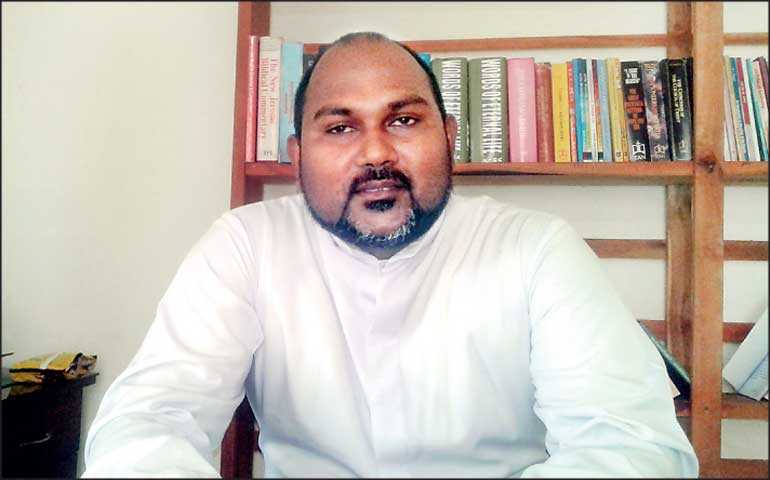
Father Amalarajan Croos
By Surya Vishwa
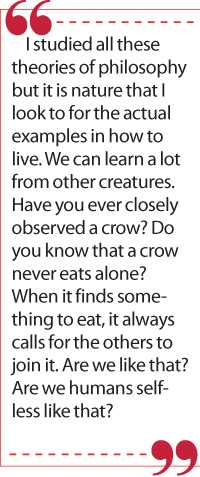 |
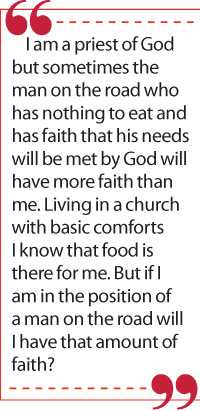 |
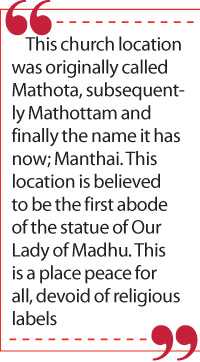 |
 |
There are hundreds and thousands of silent peace builders in Sri Lanka who daily strive to bring people together. Most of them do not belong to NGOs or INGOS. They are ordinary people and belong to different faiths. Some of them are clergy members. Whether laymen or clergy, those who touch the hearts mostly deeply of the people are those who make peace an internal ongoing process.
38-year-old Catholic priest Father Amalarajan Croos of Mannar is one such individual. Mannar, a prominent Northern Catholic location which also has a very significant Hindu culture and population and also occupied by Muslims and few Sinhalese as well, is a district that holds the potential of being a powerful foundation of religious harmony which can usher in practical societal mechanisms to diffuse any tensions that could come up.
Walking into the Ave Maria Church in the Mathai area in Mannar, what is witnessed is a beautiful church modelled after the Madhu shrine and having a historical link with it. Fr. Croos, who has taken over as parish priest six months ago explains the historical significance of the church and emphasises that the church is open to anyone, of any religion.
“This church location was originally called Mathota, subsequently Mathottam and finally the name it has now; Manthai. This location is believed to be the first abode of the statue of Our Lady of Madhu. This is a place peace for all, devoid of religious labels,” says Fr. Croos who narrates a story on how months after the Easter bomb attack in 2019, a Muslim scholar who did not first identify his profession walked into the church, told the priest that he was a Muslim and asked if it is alright if he looked around the church. This visitor had then specifically asked the priest if he being a Muslim and visiting the church was a problem.
“I asked him how it could be a problem for a Muslim to visit a Catholic church when the very name Muslim means Slave of God.”
“This gentleman turned out to be a professor promoting peace and unity in the country and as I do to all visitors who come from other districts, I invited him to have a meal with me and a cup of tea. It is after many hours that this scholar left the church,” states Fr. Croos.
The small personal library of comparative spirituality (with books on Catholicism and other philosophies/religious paths) in the church office, the absolute calmness in his manner, the fact that he does all the garden work and church manual work by himself and what he has shared so far motivate me to continue the discussion with Fr. Croos and ask him about his spiritual life.
With candid humility he states that 10 years ago he did not possess this calmness and was given to losing his temper when faced with any wrong doing by another.
“Now when confronted with any untoward action by someone else, I first ask myself whether I have done this same mistake before. If I have done, and almost always we have done the mistakes we are blaming others for, then my need to strongly blame the other person does not arise. I merely tell the person concerned not do this mistake again.”
He explains that his spiritual purification was strengthened by the four years he spent in the world as a layman after he was advised to leave the clergy by his spiritual adviser, the late Bishop of Manner Rayappu Joseph. This advice of given on account of his temper.
“I cried for weeks and went into the world where I obtained a well-paid job in a private company in the east where I worked with all communities. For the first time I was exposed to so many problems faced by people in a direct manner. I saw first-hand the issues ordinary persons were battling which I did not see when functioning as a priest. I could have stayed on in the world – I had the money, a very good job – where I was area manager for the company I worked and had social prestige that came with that kind of job and related facilities. But I did not have the happiness.
“After four years which I stringently spent on personal introspection I strived to correct my faults. After four years when I met with Bishop Joseph as a normal civilian he recognised my change immediately. When he asked me if I still wanted to be a priest, I said yes and he then put me through the spiritual process once again where I returned to fulfil my mission as someone who brings peace to people; a priest of God.”
“Any spiritual/religious path is about bringing peace to the mind so that every mind will be infused with this divine state. This is the basis of every religion whether Buddhism, Christianity, Islam and this is the basis of all very ancient belief systems such as Hinduism,” he explains.
Holding two university degrees in Philosophy and Theology he states he is not interested in obtaining a doctorate, stating that he has acquired enough of theory based knowledge.
“I studied all these theories of philosophy but it is nature that I look to for the actual examples in how to live. We can learn a lot from other creatures,” he states.
He asks me: “Have you ever closely observed a crow? Do you know that a crow never eats alone? When it finds something to eat, it always calls for the others to join it. Are we like that? Are we humans selfless like that?”
Actually, I have never thought on these lines and what I am learning in this conversation is so profound that I make a mental note to study creatures of the wild more.
Fr. Croos, continuing with his example, points out that the fact that when the Koel bird lays its eggs in the crow’s nest the crow never throwing out the baby Koel bird when it finds out the difference, shows how much of entrenched kindness we can learn from nature.
As the conversation moves to national level issues and the topic of post war reconciliation, he shares a moving story of when he was travelling to Mannar from Colombo at the height of the fighting between the LTTE and the Government military. “It was late in the night and I was wearing my white cassock which identified me as a Catholic priest and I was waiting for a bus. Finally a bus came. It was an army bus. The doors were opened for me and I was invited to enter it. It was full of soldiers. My heart was beating fast in fear. I am a Tamil man and these are Sinhala soldiers going to war. The moment I entered the bus the soldiers in the front seat got up in respect, offering the front seat the way they usually do for clergy members. From then onwards they started telling me how the war was at its height in Mannar and wanted to know if I had made any arrangements to travel from Mannar to my parish. I said no. They then made the necessary phone calls and arranged for me to be dropped at the Mannar church I served then,” says Fr. Croos.
He explains further: “These were young Sinhalese boys who were going to the war front. They did not know if they will come back alive. They asked me to pray for them. I prayed and I blessed them,” he says.
Recounting another incident again at the height of war, when he was crossing the firing line accompanied by civilians he states the ground forces were radioing the Military and Air Force that a priest was accompanied by civilians and all shooting stopped until they reached out of that location.
He emphasises about the need for faith; faith in human goodness, and faith that human wellbeing will be protected by the power there is, that could be interpreted in different faith traditions in different ways.
“I am a priest of God but sometimes the man on the road who has nothing to eat and has faith that his needs will be met by God will have more faith than me. Living in a church with basic comforts I know that food is there for me. But if I am in the position of a man on the road will I have that amount of faith?”
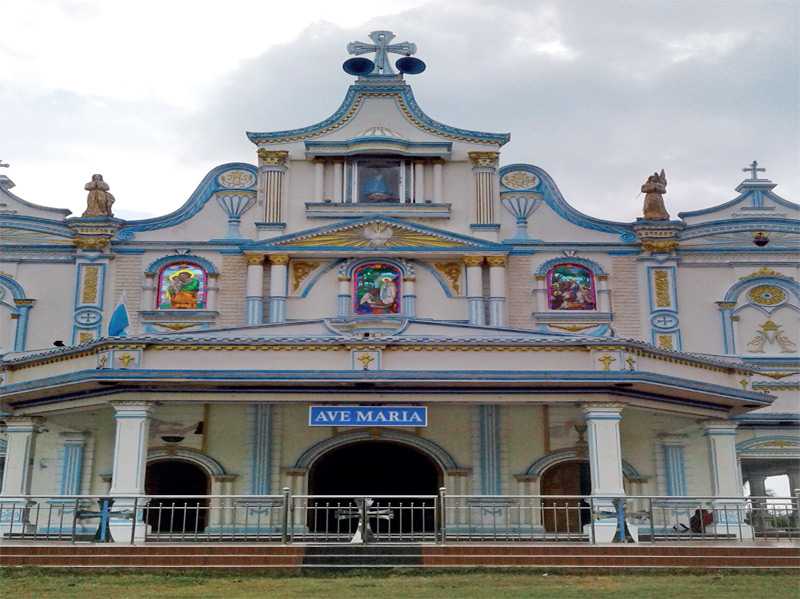
Ave Maria Church in Manthai Mannar
(Note: This article is produced as part of an initiative by the Harmony page to promote national reconciliation especially in the months of April and May and to commemorate May as a month dedicated to peace in this 12th year anniversary of ending Sri Lanka’s armed conflict.)